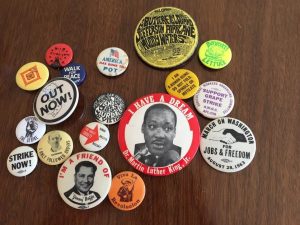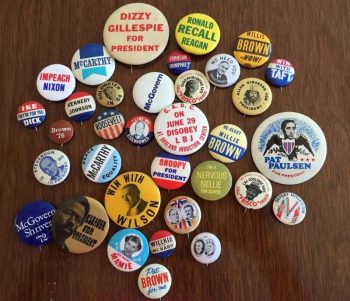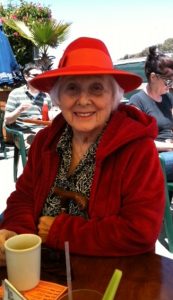
Saving the world meant throwing herself into the fray: she’d hoist a sign, march and demonstrate in the streets—for civil rights, for social justice, against the bomb, against the war, against the next war, and the next. She kept her vast collection of politically inspired buttons pinned to a large piece of felt, ready to stick on her hat or jacket as she headed off to the next rally or picket line: We Shall Overcome. Make Love, Not War. Another Mother for Peace.
A constant parade of unemployed writers, between-gig actors, labor organizers, and fellow progressives showed up at the L.A. apartment, arguing politics over red wine and plates of pasta long into the night. Hugs and handshakes always followed the loud voices and f-bombs at evening’s end. Things were not like that at my house.
When her family moved back home to San Francisco, my aunt began contributing articles and photographs to her neighborhood newspaper, The Potrero View. She subsequently took on the roles of editor and publisher.
]During her three decades at the paper, Ruth was honored for her service to The View, and to the Neighborhood House, a community center where she helped organize after-school programs, classes for adults, and events that celebrated the scrappy diversity of the “nabe.”
At an event honoring my aunt for her work, the mayor read a proclamation loaded with “whereases,” and declared a day in her honor. When he finished speaking, my father leaned toward me and pointed proudly at his “baby” sister. “Look at her—she’s the richest person in this room.” And I knew what he meant.
Ruth never pandered to anyone: you could always count on her to be outspoken, feisty, honest but kind, and a champion of the underdog. She would confront racism or social injustice wherever she found it, no matter who the guilty party might be. And she mastered the art of being cool without even trying.
When I went back to graduate school at age 58, I hoped I could model myself after Ruth. She was always able to engage effortlessly with everyone: young and old, well-off and well-connected, or down-on-their luck.
I often asked myself: what would Ruth do? And I knew that she would act like it was no big deal to be sitting in workshop with students a few decades younger. I could imagine her saying, “Get over yourself and do the work you came to do.”







What a cool aunt and a wonderful model and mentor. I was so sorry to read that she developed dementia. Isn’t is always the smart, saucy ones? I’m delighted you’re fulfilling her wish of writing about her.
Risa, I love your stories about both of your aunts. How fabulous that Ruth was going to demonstrations and marching on picket lines back in the day. And she showed you how to apply three shades of lipstick to boot! The pictures are great too, and your last paragraph brought a lump to my throat. Thanks for sharing Ruth and Rockie with us.